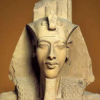Akhenaton

Akhenaton
Akhenatenknown before the fifth year of his reign as Amenhotep IV, was an Ancient Egyptian pharaoh of the Eighteenth Dynasty who ruled for 17 years and died perhaps in 1336 BC or 1334 BC. He is especially noted for abandoning traditional Egyptian polytheism and introducing worship centered on the Aten, which is sometimes described monolatristic, henotheistic, or even quasi-monotheistic. An early inscription likens the Aten to the sun as compared to stars, and later official language avoids calling the Aten...
NationalityEgyptian
ProfessionStatesman
CountryEgypt
As a camel beareth labor, and heat, and hunger, and thirst, through deserts of sand, and fainteth not; so the fortitude of a man shall sustain him through all perils.
As the whirlwind in its fury teareth up trees, and deformeth the face of nature, or as an earthquake in its convulsions overturneth whole cities; so the rage of an angry man throweth mischief around him.
Though thou art far away, thy rays are on Earth; Though thou art in their faces, no one knows thy going.
Say not unto thyself, Behold, truth breedeth hatred, and I will avoid it; dissimulation raiseth friends, and I will follow it. Are not the enemies made by truth, better than the friends obtained by flattery?
Be thou incapable of change in that which is right, and men will rely upon thee. Establish unto thyself principles of action; and see that thou ever act according to them. First know that thy principles are just, and then be thou.
The heart of the hypocrite is hid in his breast he masketh his words in the semblance of truth, while the business of his life is only to deceive.
Know thyself as the pride of His creation, the link uniting divinity and matter; behold a part of God Himself within thee; remember thine own dignity nor dare descend to evil or meanness.
Scorn also to depress thy competitor by any dishonest or unworthy method; strive to raise thyself above him only by excelling him; so shall thy contest for superiority be crowned with honour, if not with success.
What is the source of sadness, but feebleness of the mind? What giveth it power but the want of reason? Rouse thyself to the combat, and she quitteth the field before thou strikest.
True wisdom is less presuming than folly. The wise man doubteth often, and changeth his mind; the fool is obstinate, and doubteth not; he knoweth all things but his own ignorance.
A contented mind is a hidden treasure, and trouble findeth it not.
As a rock on the seashore he standeth firm, and the dashing of the waves disturbeth him not. He raiseth his head like a tower on a hill, and the arrows of fortune drop at his feet. In the instant of danger, the courage of his heart here, and scorn to fly.
Those who gave thee a body, furnished it with weakness; but He who gave thee Soul, armed thee with resolution. Employ it, and thou art wise; be wise and thou art happy.
labor not after riches first, and think thou afterwards wilt enjoy them. He who neglecteth the present moment, throweth away all that he hath. As the arrow passeth through the heart, while the warrior knew not that it was